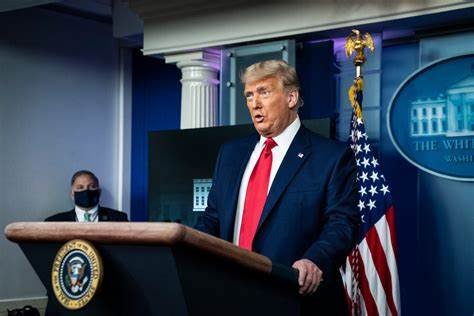In a historic and stunning political comeback, former President Donald Trump returned to power after a fiercely contested 2024 election. His victory marks a dramatic moment in American political history, one that has upended expectations and reshaped the nation’s political landscape. Having previously left office in 2021 under contentious circumstances, Trump’s return signals a renewed commitment to reshape American institutions according to his vision—one focused on nationalism, conservative cultural policies, and reasserting U.S. dominance on the global stage.
Trump’s return has been described as one of the most remarkable political recoveries in modern American history. After leaving office amid turmoil, including the January 6th Capitol riot, and facing multiple legal challenges, Trump defied the odds and won a second term. His triumph is seen as a direct rebuke of the political establishment and a sign of his unwavering appeal to millions of Americans who feel disillusioned with the political elite.
However, his return to power has deepened the already intense division within the country. Supporters see Trump as a champion of American values and a bulwark against the overreach of federal bureaucracy and globalist policies. His critics, on the other hand, view his rise as a dangerous move that could undermine democratic institutions and further polarize the nation.
Trump’s second term is expected to be shaped by a series of bold actions aimed at reshaping the country’s direction. In his second inaugural address, he declared the dawn of a “golden age” for America, with a focus on nationalism and restoring American greatness. Key components of his agenda include:
A core element of Trump’s agenda has always been immigration reform. In his second term, he has made it clear that he intends to take a hardline stance on immigration, particularly illegal immigration. With plans to enhance border security and crack down on “criminal immigrants,” Trump is positioning himself as the ultimate defender of American borders. He has promised to reinstate controversial policies such as the “Remain in Mexico” program and accelerate deportations. These measures are aimed at curbing the flow of illegal immigrants into the U.S. and satisfying his base’s demand for stricter immigration controls.
Trump has emphasized economic nationalism as a key driver of his policy platform. He has vowed to impose tariffs and take measures to protect American jobs from foreign competition. The creation of an “External Revenue Service” is a central part of this vision, designed to ensure that American industries are not undermined by unfair trade practices from other nations. Trump has also promised to undo Biden-era climate policies, focusing instead on promoting fossil fuel industries and eliminating restrictions on oil and gas production.
One of the most consistent themes in Trump’s rhetoric is his desire to reassert American power on the world stage. In his second term, he has vowed to adopt a more isolationist foreign policy, pulling back from global commitments that he views as detrimental to American interests. Trump has criticized the U.S. government’s support for Ukraine in its conflict with Russia, positioning himself as the protector of American resources and interests over foreign entanglements.
Cultural issues are central to Trump’s political identity. In his second term, Trump has pledged to take on progressive policies in education, gender, and race. He has emphasized his opposition to what he views as radical ideologies, promising to undo initiatives that promote progressive agendas in schools and government institutions. His commitment to defining gender strictly as biological—male and female—signals his continued alignment with conservative social values, a move that will likely galvanize his base while alienating his critics.
Trump has long promised to “drain the swamp” and reform Washington, D.C. His second term will see the continuation of this agenda with renewed vigor. He has indicated that he will seek retribution against political opponents, particularly those involved in investigations into his actions during his first term. Trump has also pledged to introduce measures that reduce the power of federal agencies, focusing on reducing bureaucratic overreach and scaling back regulations that he argues stifle American businesses.
Despite his victory, Trump’s return to power is fraught with legal challenges. He continues to face multiple ongoing investigations, some of which could result in criminal charges. While Trump has positioned these legal challenges as politically motivated attacks, the outcomes of these cases could have significant implications for his administration’s ability to implement its agenda.
Additionally, Trump’s claims about the 2020 election being “rigged” remain a contentious issue. His continued insistence on these claims has deepened the political divide, with many Americans questioning the legitimacy of his victory. In response, Trump has emphasized his commitment to making future elections “too big to rig,” but his rhetoric continues to fuel concerns about the integrity of U.S. democracy.
Trump’s return to power is not just a personal triumph—it is a pivotal moment for the nation. America is at a crossroads, with deeply entrenched political and cultural divisions. Trump’s presidency, particularly in his second term, will undoubtedly be defined by his aggressive approach to governance, his unwavering loyalty to his base, and his pursuit of a vision that challenges the status quo. Whether his policies will bring about the “golden age” he promises, or exacerbate the divisions within the country, remains to be seen. What is clear, however, is that Trump’s second term will be marked by profound changes to the American political and institutional landscape.


